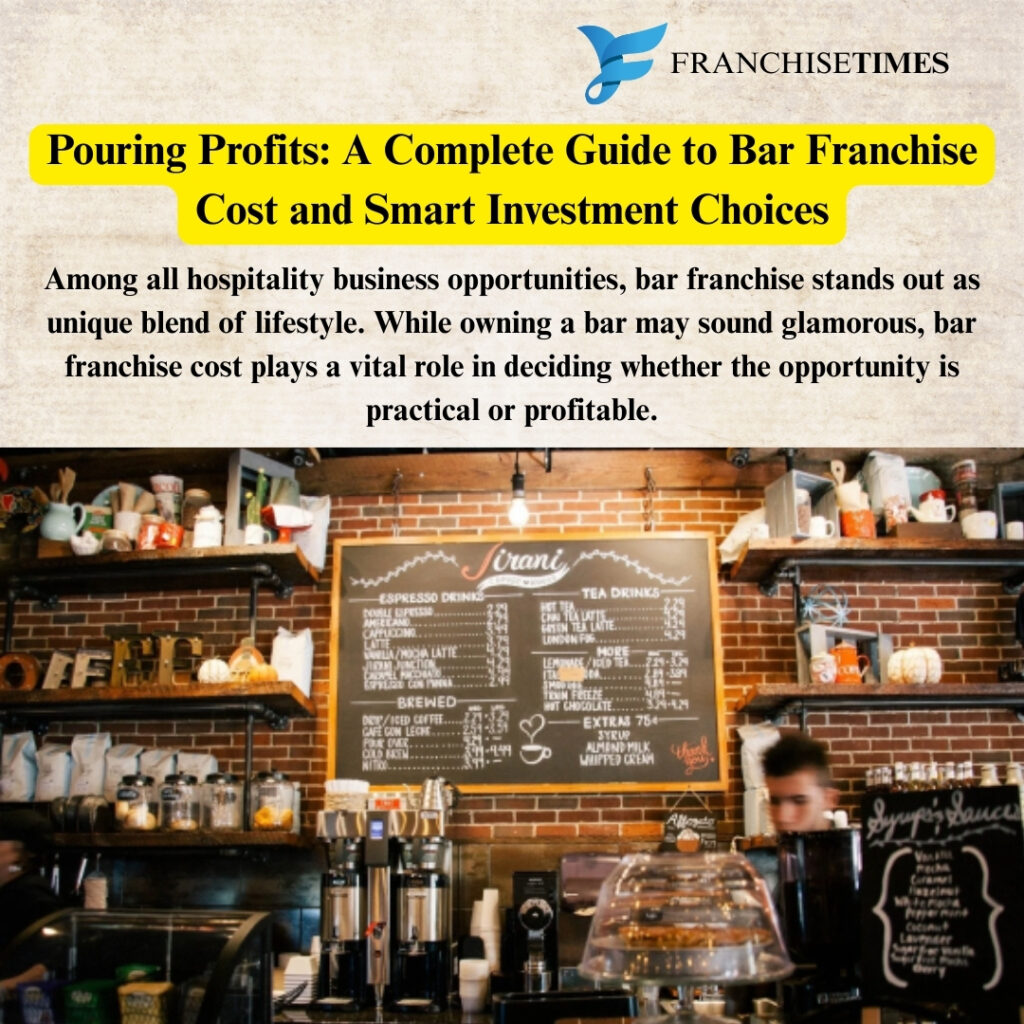Pouring Profits: A Complete Guide to Bar Franchise Cost and Smart Investment Choices
The hospitality industry is one of the most exciting fields for entrepreneurs who enjoy social interactions, vibrant atmospheres, and steady profits. Among all hospitality business opportunities, a bar franchise stands out as a unique blend of lifestyle and investment. While owning a bar may sound glamorous, the Bar Franchise Cost Guide plays a vital role in deciding whether the opportunity is practical or profitable. In this detailed guide, we will explore every factor that affects the cost of running a bar franchise, how to prepare for financial commitments, and why careful planning can lead to long-term success.

Unlike starting a bar independently, franchising allows you to benefit from an established brand, tested systems, and ongoing support. Yet, every franchise comes with a price tag that covers entry fees, setup expenses, and operational investments. This blog will break down the Bar Franchise Cost Guide into understandable sections, highlight additional hidden expenses, and offer strategies to manage them wisely. If you are serious about owning a bar franchise, you must understand the real numbers before you make a move.
Understanding the Real Components of Bar Franchise Cost
When potential investors look at the bar franchise cost, they often focus only on the franchise fee or the royalty percentage. However, the cost of running a bar franchise is made up of several interconnected parts. Each component affects your overall budget and can change depending on the location, brand reputation, and size of the bar.
First, the franchise fee acts as the entry ticket into the brand’s business system. This fee grants you the right to use the company’s name, logo, and business model. Depending on the brand’s popularity, this cost can range from ₹5 lakh to ₹50 lakh or more in India, and even higher internationally. Well-established brands charge more because their name recognition brings instant customers.
Second, real estate and location costs influence the largest chunk of your investment. Opening a bar in a prime commercial area will always cost more, but it also ensures higher footfall. You must budget for leasing or buying space, along with renovation costs to match franchise brand guidelines.
Third, the setup and interior design costs determine the customer experience. Bars must reflect a unique vibe—modern, retro, sports-themed, or lounge-style. The franchise usually provides a design manual, and adhering to it ensures brand consistency. This step may cost anywhere between ₹20 lakh and ₹1 crore, depending on the theme and size.
Fourth, the equipment and inventory costs cover bar counters, refrigerators, glassware, kitchen essentials, music systems, and initial liquor stock. High-quality equipment is non-negotiable in the bar business because poor infrastructure directly affects service quality.
Finally, training and staffing costs complete the initial setup. Franchises train staff in brand standards, but the franchisee pays for hiring, training, and salaries. Salaries for bartenders, chefs, waitstaff, and managers should be included in the operational budget from the very beginning.
When combined, all these expenses show that the bar franchise cost is not a single number but a comprehensive package. Entrepreneurs must evaluate each element carefully to avoid financial surprises later.
Key Factors That Influence the Bar Franchise Cost
Even though the franchise provides a cost structure, many variables influence how much you end up spending. Understanding these factors helps you plan better and ensures that you don’t overshoot your budget.
1. Location: A bar in a metropolitan city costs more than one in a smaller town. Rent, licenses, and customer expectations vary widely depending on the city. For example, a bar in Bangalore’s MG Road will demand higher investment than one in a suburban area.
2. Brand Value: Popular bar franchises like Hard Rock Café, The Irish House, or Beer Café command higher fees because of their established brand equity. However, lesser-known franchises may offer lower costs but need extra marketing efforts to attract customers.
3. Size and Concept: A microbrewery franchise costs much more than a small sports bar. Similarly, a premium cocktail lounge requires larger investment compared to a casual beer café. The bar franchise cost changes drastically based on the chosen concept.
4. Licensing and Legal Expenses: The alcohol industry is heavily regulated. Liquor licenses, bar permits, food safety approvals, and fire safety clearances all carry costs. Depending on the state, liquor license fees alone can range from ₹10 lakh to ₹25 lakh annually.
5. Staffing Requirements: A larger bar needs more employees. Salaries, training, uniforms, and employee benefits add up. Staff turnover in the hospitality industry is also high, which means constant recruitment expenses.
6. Marketing and Promotions: While the franchise may offer centralized marketing support, local promotions are your responsibility. Events, discounts, social media campaigns, and sponsorships are crucial for building a loyal customer base.
7. Operational Costs: Electricity, water, POS systems, and music licensing fees contribute to monthly costs. Since bars often run late into the night, utility bills are much higher compared to regular restaurants.
These factors prove that the bar franchise cost is not fixed but flexible. Smart entrepreneurs analyze these areas before finalizing an agreement with a franchisor.
Average Bar Franchise Cost Breakdown in India
To help you get a clear picture, let us break down the bar franchise cost in India into average figures. These numbers vary by city and brand, but they provide a reasonable estimate for planning purposes.
- Franchise Fee: ₹5 lakh – ₹50 lakh
- Location Lease or Purchase: ₹20 lakh – ₹1.5 crore (depending on city and area size)
- Renovation and Interiors: ₹20 lakh – ₹1 crore
- Equipment and Setup: ₹10 lakh – ₹40 lakh
- Liquor License: ₹10 lakh – ₹25 lakh per year
- Inventory and Initial Stock: ₹5 lakh – ₹15 lakh
- Staffing and Training: ₹5 lakh – ₹20 lakh
- Marketing Budget: ₹2 lakh – ₹10 lakh initially
- Working Capital Reserve: ₹10 lakh – ₹30 lakh
When you add these up, the total bar franchise cost in India usually falls between ₹80 lakh and ₹3 crore. Smaller franchise formats may cost less, while premium international franchises can exceed these numbers significantly.
It’s important to note that these costs do not include ongoing royalties and revenue sharing, which are a percentage of monthly sales. Typically, royalties range between 5% and 12% of gross revenue.
Investors must prepare not only for initial expenses but also for sustaining operations during the first year. Most new bar franchises take six to twelve months to reach breakeven, so working capital is essential.
Managing Bar Franchise Cost: Smart Investment Strategies
The bar franchise cost may appear overwhelming at first glance, but with the right strategies, you can manage expenses effectively. Smart planning ensures you maximize profits while minimizing risks.
1. Choose the Right Franchise Brand: Selecting a brand with strong recognition and proven systems is worth the higher fee. A well-known brand reduces your marketing burden, helping you recover investment faster.
2. Negotiate Location Costs: Landlords often inflate rental rates for commercial spaces. Negotiating favorable lease terms can reduce your overheads significantly. Look for emerging areas with high growth potential rather than established but saturated zones.
3. Control Renovation Expenses: While following brand design is necessary, avoid unnecessary luxury upgrades that don’t add direct value. Focus on customer comfort and functionality instead of extravagant décor.
4. Optimize Inventory Management: Liquor wastage and theft are common issues in bars. Use technology-based POS systems to track inventory and prevent losses. Maintaining lean stock reduces holding costs while ensuring availability.
5. Invest in Staff Retention: High staff turnover increases expenses. Offering competitive salaries, training, and incentives helps retain skilled bartenders and servers, which saves recruitment costs in the long run.
6. Market Strategically: Instead of spending excessively on promotions, focus on targeted campaigns that resonate with your local audience. Hosting theme nights, live music events, or happy hours can attract steady crowds at reasonable costs.
7. Plan for Seasonal Variations: Bar businesses see fluctuations during festivals, holidays, and weekends. Maintaining a financial buffer ensures smooth operations during lean months.
By applying these strategies, you can keep the bar franchise cost under control and maximize your return on investment.
Is the Bar Franchise Cost Worth It? Long-Term Profitability and ROI
After analyzing the numbers, many entrepreneurs wonder: Is the bar franchise cost really worth it? The answer depends on your commitment, location, and ability to manage operations.
The bar industry is known for high-profit margins, especially on alcoholic beverages. A simple cocktail sold for ₹500 may only cost ₹100 to prepare, giving you a healthy margin. However, success is not guaranteed. It requires consistent quality, great customer service, and strong marketing.
International and premium Indian bar franchises often achieve breakeven within 18–24 months, while smaller franchises may take longer. With effective management, investors can expect returns of 20–30% annually after breakeven.
Moreover, the hospitality industry thrives on repeat customers. Bars with good ambiance, signature drinks, and engaging events create loyal communities that generate steady revenue. In this way, the initial bar franchise cost pays off through long-term sustainability.
That being said, potential investors must prepare for challenges such as government regulations, shifting consumer preferences, and high competition. A well-researched plan and realistic financial projections are the keys to success.
Conclusion: A Clear Picture of Bar Franchise Cost and Success Potential
Investing in a bar franchise is not just about pouring drinks—it is about creating experiences, building communities, and managing finances effectively. The Bar Franchise Cost Guide covers far more than the franchise fee. It includes real estate, licensing, interiors, equipment, staffing, marketing, and working capital. Depending on the concept and location, the investment can range from ₹80 lakh to ₹3 crore in India.
While the costs are significant, the rewards can be equally impressive. Bars are profitable businesses when managed wisely, with margins that surpass many other hospitality ventures. By choosing the right brand, planning expenses carefully, and focusing on long-term sustainability, you can turn a high upfront investment into a thriving business.
In the end, the bar franchise cost is not just a financial number—it is the foundation of an entrepreneurial journey filled with opportunities for growth, creativity, and success.
